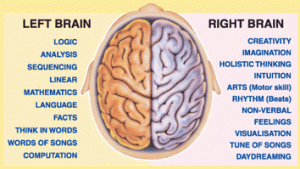
As you may know, our brain processes are governed distinctively by our right and left hemispheres.
The right hemisphere is associated with creative skills, emotion, intuition and art; while the left side of our brains is associated with logic (including Math), calculations, memorization and data analysis.
From point of view related to the composition process, the right side of the brain is the one that triggers the creation, it does not judge, is the “child”, from the Transactional analysis perspective. This part of the brain is responsible for the first stage of the creation process, it is very important to be aware not to “stop the momentum”, as we said before, the being the “child”, it can be whimsical and may come when we never expect it…our inspiration can come on the most unpredictable, awkward or even annoying situations, but when this happens, please do not despair or let the left side of the brain try to restrain the situation, take one minute to record your idea on your mobile, or write down on a piece of paper your main idea or concept (the “big picture”), because then, after the creation is done, the left part of our brain, the one which is in charge of giving the structure, the “adult” (Transactional analysis) will come to do what it does best: work by chunks, divide, subdivide, give shape and work on the details, and bit by bit, you will see your piece grow.
In a nutshell, don’t expect the child to behave as an adult, and don’t wait for the adult to behave as a child! Let them be what they are, and take the advantage of each one, know how they operate, and you will see the changes.
It is paramount as artists and creators, to raise our awareness about these processes that are always taking place in our brains and to know from where the processes are taking place at any given time. This will organise us in our work. “Know thyself” as Socrates well said. If we are not conscious of the things that are happening in our brains, and which triggers what…how can we ever be effective and productive as creators? We must be prepared for the life of a composer, in which the commissions’ deadline are most probably just one or two weeks, even days!

